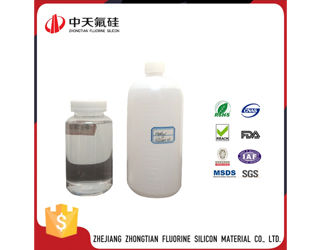Silicone Fluid

Beskrywing van die produk
Silicone fluids have unique properties because they are not products of petroleum or organic chemistry. They were the first, and are still the only, major class of polymers that are products of inorganic chemistry.
Zhongtian Silicone Fluid Product Series
Among the whole products series, the silicone fluid product series launched by Zhongtian as the silicone products manufacturer is also worth a look. As liquid silicone suppliers, we offer high-quality polydimethylsiloxane and the best liquid silicone oil that can be directly used in the damp proof, insulation, damping, shock absorption, defoaming, lubrication, polishing, etc.
Silicone Fluid Properties
Generally speaking, silicone fluid is colorless (or light yellow), tasteless, non-toxic, non-volatile liquid. Silicone fluid has the following special properties:
· high and low-temperature resistance
· electrical insulation
· weather resistance
· physiological inertia and small surface tension
· no corrosion to metal
· good insulation
Due to these properties, silicone fluid enjoys excellent effect in many aspects. Among all kinds of silicone oil, methyl silicone oil is the most widely used and the most important one
Silicone Fluid Application
The application of silicone fluid is now extending to the following fields r industries:
· Nano components: microflow channel, micromixer, micro pump, microvalve, etc.
· Body filling: breast filling
· Aerospace: protective coating of surfaces
Description of Silicone Fluid
Silicone fluid usually refers to a linear polysiloxane product that remains liquid at room temperature. It is generally divided into two categories: methyl silicone fluid and modified silicone fluid. The most commonly used silicone fluid - methyl silicone fluid, also known as ordinary silicone fluid, whose organic groups are all methyl, methyl silicone fluid has good chemical stability, insulation, and good hydrophobic properties. It is made by hydrolysis of dimethyl dichlorosilane with water to make the initial condensation ring body, the ring body by cracking, distillation to make a low ring body, and then the ring body, capping agent, catalyst put together to adjust the polymerization can get a variety of different polymerization degree of the mixture, by reducing the distillation to remove the low boiling material can be made of silicone fluid.
Advantages and Disadvantages of Silicone Fluid
Advantages
(1) The viscosity and temperature performance is the best among liquid lubricants, and the viscosity changes little in wide temperature range. Its freezing point is generally less than -50℃, some are as high as -70℃, and its oil appearance and viscosity do not change when stored for a long time at low temperature, it is a base oil that can take into account high temperature, low temperature and wide temperature range.
(2) Excellent thermal oxidation stability, such as thermal decomposition temperature >300℃, small evaporation loss (150℃, 30 days, evaporation loss is only 2%), oxidation test (200℃, 72h), small changes in viscosity and acid value.
(3) excellent electrical insulation, volume resistance, etc. does not change in the range of room temperature ~ 130 ℃ (but the oil can not contain water).
(4) It is a non-toxic and low foaming, strong anti-foaming oil, can be used as antifoaming agent, etc.
(5) Excellent shear stability, has the function of absorbing vibration and preventing vibration transmission, and can be used as vibration damping fluid.
Disadvantages
(1) The lubricity of silicone oil is not good, especially for the poor lubrication of the steel friction side.
(2) The coefficient of thermal expansion of silicone oil is large (may produce overpressure problem).
(3) Large gas solubility (difficult to design gas sealing device).
(4) A certain degree of hygroscopicity (after the water content is higher than 100×10-6, the electrical performance drops sharply).
(5) Small surface tension (easy to leak from the machine).

